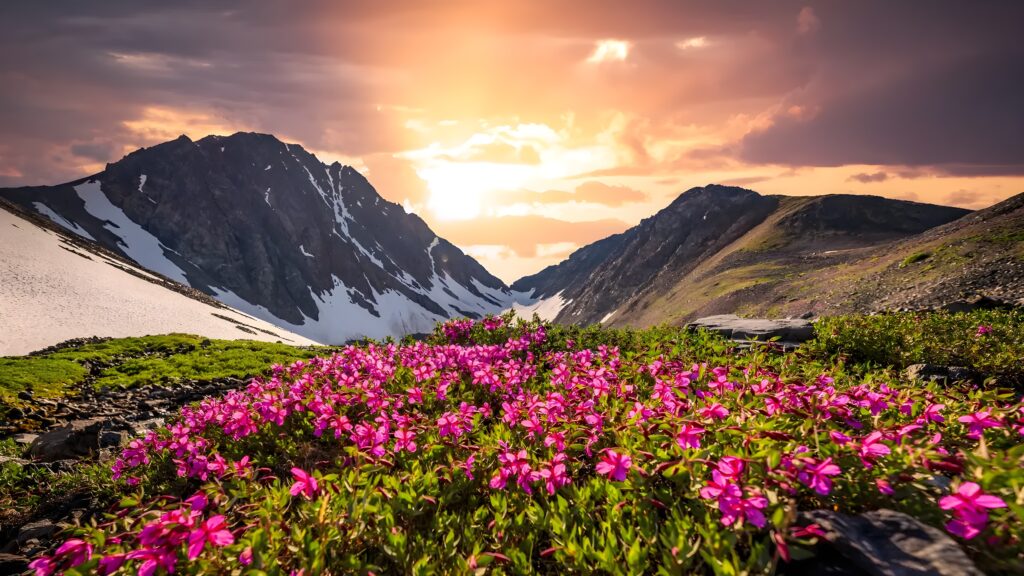Experience the magic of the monsoon season on one of India’s most celebrated trekking routes. The Valley of Flowers Trek in 2025 promises not only a visual feast of blooming wildflowers but also a refreshing escape into nature’s vibrant monsoon charm. Below is a comprehensive guide to planning your unforgettable journey.
Why Choose the Monsoon Season?
The monsoon breathes new life into the Valley of Flowers:
- Lush Landscapes: Rainfall intensifies the hues of wildflowers and green meadows, transforming the valley into a painter’s palette of colors.
- Cooler Temperatures: The monsoon offers a refreshing climate, ideal for trekking and exploring the scenic beauty of the region.
- Unique Experience: Fewer tourists during the monsoon season mean a quieter, more intimate experience with nature.
Trek Highlights
- UNESCO World Heritage Site: Immerse yourself in the history and natural splendor of this globally recognized site.
- Biodiversity Hotspot: Witness a rich variety of flora and fauna that thrive in the monsoon-enhanced environment.
- Spiritual Journey: Besides its natural beauty, the Valley of Flowers holds cultural and spiritual significance, adding depth to your adventure.
Getting There
By Air
- Nearest Airport: Jolly Grant Airport, Dehradun, provides the easiest access to the region.
By Rail
- Nearest Railway Stations: Rishikesh or Haridwar, followed by a road trip to Govindghat.
By Road
- Govindghat: The starting point for the trek, accessible via regular bus services and taxis from major cities in Uttarakhand.
Trek Itinerary
Day 1: Arrival at Govindghat
- Arrive in Govindghat and settle in. Use this day to acclimatize and prepare for the trek ahead.
Day 2: Govindghat to Ghangaria (Approximately 13 km / 5-6 hours)
- Begin your journey from Govindghat, trekking through scenic trails enriched by the monsoon rains.
- Reach Ghangaria, the base camp, where you can rest and enjoy local hospitality.
Day 3: Ghangaria to Valley of Flowers (3-4 km / 2-3 hours)
- Trek to the Valley of Flowers early in the morning to witness the valley bathed in soft monsoon light.
- Explore the valley, taking in the breathtaking views and diverse flora.
- Return to Ghangaria in the afternoon or opt to camp within designated areas (subject to park regulations).
Day 4: Return to Govindghat
- Begin your descent back to Govindghat.
- Reflect on the adventure and the unique experiences of trekking during the monsoon.
What to Pack
- Clothing: Layered clothing suitable for variable monsoon weather, including waterproof jackets and quick-dry fabrics.
- Footwear: Durable trekking boots with excellent grip to handle slippery paths.
- Rain Gear: A reliable raincoat, waterproof backpack cover, and extra socks.
- Accessories: Sunhat, sunglasses, and high-SPF sunscreen.
- Gear: Trekking poles, a basic first-aid kit, and a sturdy backpack.
- Miscellaneous: Energy snacks, personal medication, and a reusable water bottle.
Safety Tips for Monsoon Trekking
- Weather Monitoring: Keep a close eye on weather updates; monsoon rains can cause sudden changes.
- Local Guides: Hiring an experienced local guide can enhance your safety and provide valuable insights.
- Trail Conditions: Be cautious of slippery trails and potential landslides; always follow marked paths.
- Health Precautions: Stay hydrated and be prepared for altitude-related issues by acclimatizing properly.
Conclusion
The Valley of Flowers Trek in 2025 is not just a journey; it’s a vibrant celebration of nature in its most dynamic season. The monsoon enhances every aspect of the trek, from the lush landscapes to the refreshing climate, ensuring a unique adventure for every traveler. Whether you’re an experienced trekker or a nature enthusiast, this monsoon trek offers a perfect blend of adventure, serenity, and breathtaking beauty.
